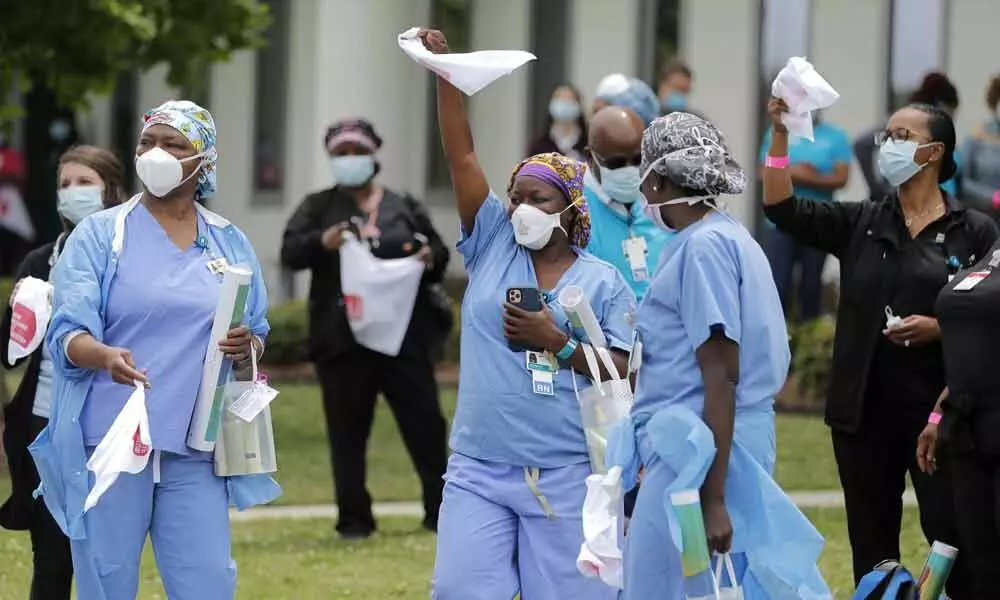Live
- Berhampur: E-bike showroom catches fire
- Chief Secy Manoj Ahuja’s tenure extended
- Bhubaneswar: Street vendors protest eviction
- Dr Manmohan imparted new direction to economy: Majhi
- Today’s Horoscope for 28 December 2024: Embrace Daily Insights of Your Zodiac Sign and Unlock Your Potential
- Neelam Kothari’s trip to Mauritius fulfils this promise she made to daughter Ahana
- Samantha craves this simple thing in a busy world
- Simple and easy steps to follow this wedding season
- Santosh Trophy: Rahman’s lone goal sees Kerala sail to semis
- World Rapid Chess Championship: Arjun tied fifth after first day
Just In
A look back, and follow-up, on coronavirus good-deed tales


An act of generosity or self-sacrifice. A whimsical gesture to distract neighbours from anxiety or cabin fever.
Florida: An act of generosity or self-sacrifice. A whimsical gesture to distract neighbours from anxiety or cabin fever. A helping hand to a person thrown out of a job, support for a patient struggling with COVID-19, solidarity with the medical professional toiling day and night to save them.
Nearly three months later, there's been no end to the tales of good deeds we've found. Whitney Rutz began making giant cinnamon rolls in March, initially to amuse herself and later, as they took off online, to raise money for the Oregon Food Bank. By now the Portland, Oregon resident has rustled up more than $50,000 in donations and sent out over 100 rolls, most of them to health care and other essential workers. "Some weeks it was overwhelming," she says, reached by AP for a follow-up. "Other times it was the most uplifting experience." With the nation in ongoing turmoil, including nearly two weeks of outrage and nationwide protests over the police killing of George Floyd, Rutz is looking to use her rolls to support other causes. She's still working out details, but she'd like to help schoolkids from low-income families: "It has a lot to do with racial inequities.
The kids are our future." Even "while our country is suffering," Rutz adds, "I really have started to believe that the world is mostly made of good people." Emily Bauman and a friend donated their government-issued pandemic stimulus checks last month to fund a " stimulus-serenade " for health workers. The May 19 performance not only cheered up the New Orleans East Hospital staffers who danced and clapped along, it meant a paid gig for members of the New Orleans Jazz Orchestra. The performance exceeded her expectations. "From the feedback I got … it seemed like a community formed around the event," Bauman says today. Bauman, who lives in New York City, watched the spectacle via live feed that day. She says she was moved that the orchestra included a local parade tradition known as a second line, which originated with organizations helping people with illness and loss.
Bauman was also gratified to see the story get national attention: "That means that it resonates with communities everywhere, which is what I was hoping." In India, which ordered one of the world's strictest lockdowns, feeding the working poor at a time they couldn't work was an obvious concern. The Sikh temple Bangla Sahib Gurdwara in New Delhi rose to the challenge, ramping up a kitchen operation that already fed a half-million people per week to help the growing ranks of the unfortunate. With virus cases spiking in the country even as the lockdown eased the first week in June, the temple has had to adapt to challenges but is still producing millions of meals. It lost some distribution partners when charities that lent vehicles reclaimed them for other projects.
Emails poured in from around the world after the story was published from people wanting to donate: An Australian man sent $100, a Canadian doctor $50. But cash is still tight. The temple has used its dwindling funds to hire a fleet of trucks and drivers to keep delivering 100,000 meals a day to some 30 drop-off points where people form long lines holding tin pitchers and bowls to fill and take home. Temple president Manjinder Singh Sirsa says they used their TV channel to appeal for more help, leading to pledges of five more loaned vehicles. May 22 was the second annual 1-4-3 Day when Pennsylvanians are encouraged to be extra kind to their neighbours. Inspired by the nicest guy in the history of children's television, the late Mister Rogers, it took on new poignance this year for focusing on first responders and other essential workers risking their health every day during the pandemic.
The 143rd day of the year, its name is a nod to the number of letters in each word of Fred Rogers' favourite phrase, "I love you." A state website asked people to share stories of goodness and has tracked more than 4,900 of them since May 22. One woman ran 1.43 miles to honour her nurse father. Another baked cookie for frontline workers. A girl left a thank you note in the mailbox for her letter carrier. A food bank in central Pennsylvania delivered meals to a nursing home. Others sang songs about kindness, bought coffee for the person in line behind them and donated blood. The governor's office says #143DayInPA was the top Twitter trending topic in the state and went as high as No. 25 nationwide. "I think now ... we could all use a little more kindness in our lives," Philadelphia Mayor Jim Kenney says.

© 2024 Hyderabad Media House Limited/The Hans India. All rights reserved. Powered by hocalwire.com






